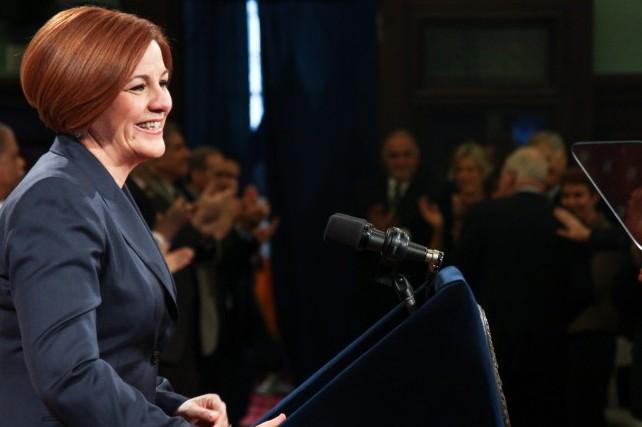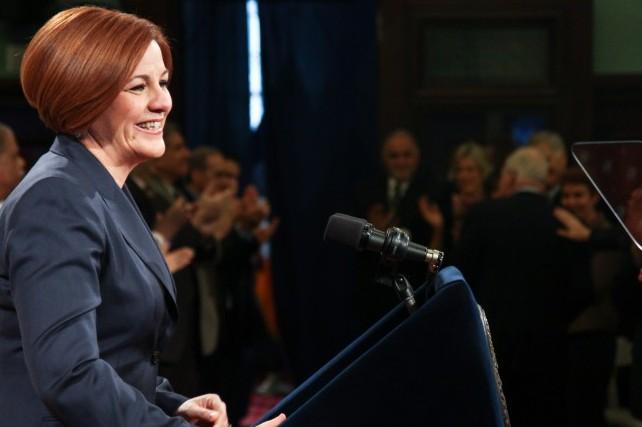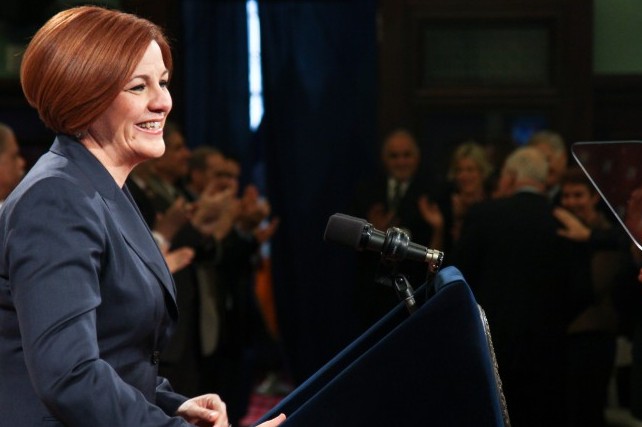NEW YORK—City Council Speaker Christine Quinn outlined a number of proposals on Thursday during the State of the City address, including initiatives that would create jobs and boost education.
Building on Existing Talent
A new Design Week, modeled from the popular Fashion Week, would market the nearly 40,000-person-strong industry. Design encompasses interior decorating, movie production, and architecture, among other sectors.
“Fashion Week, which starts today, brings 300,000 visitors and nearly $800 million into our city every year,” said Quinn at City Hall during her address. “New York City Design Week will be a global event, attracting visitors from around the world and putting our designers right in the spotlight.”
Quinn envisions hooking up with community groups that already hold design events.
Job creation isn’t necessarily starting from scratch, said Quinn. Design Week is an example of how the city can work to “harness the potential of some of New York’s strongest industries,” creating jobs in the process.
Technology startups, and big names such as Meetup, Tumblr, and Twitter, are part of another strong industry—the rapidly growing tech sector. A recently formed venture capital fund supports tech startups in DUMBO, the Brooklyn Navy Yard, and Downtown Brooklyn, said Quinn, and a new software language certificate program at City University of New York will equip residents with skills to get jobs in the tech field.
To encourage investment in neighborhoods with high unemployment, the city plans on starting a $10 million small-business loan fund with federal money, and a new internship program with paid training and job placement.
Quinn also mentioned outlawing discrimination against unemployed job seekers. She hears stories of people who’ve been turned down from a job because they’ve been unemployed for too long. The average length of unemployment, according to Quinn, is 41 weeks. City unemployment is currently 9 percent.
Rebuilding education
Quinn hopes to reform the education system with the help of Nancy Zimpher.
Zimpher, now chancellor of State University of New York, helped reform the Cincinnati school system through Strive Partnership. The partnership links together different groups, such as colleges, nonprofits, and businesses, taking a cradle-to-career approach, or a more comprehensive outlook of a child’s education.
“It is a myth that one person or group can fix education by themselves, no matter how visionary or passionate,” Chancellor Zimpher said on Feb. 7, according to a transcript. “Only by working together—public and private institutions of higher education, state education departments and school districts, civic and corporate leaders and elected officials—will we see results.”
Independent think tank Education Sector published a report last November detailing the success of Strive Partnership. However, applying these principles to the whole city may be more difficult, said Richard Colvin, Education Sector’s executive director.
“Getting the politics right is going to be important,” said Colvin, noting the importance of having an intermediary between the public and private interests involved. “Cincinnati is a large city, but it is a fraction of the size of New York, so they’re going to have to do it by clusters or districts—even if they do it by borough it would be daunting.”
Other education initiatives Speaker Quinn proposed include making kindergarten mandatory, restoring funding to CUNY, and building an honors college.
Opportunity missed
Quinn announced a task force that would help root out crime by repairing rundown areas that invite crime. She noted another task force, formed last summer that counters gun violence.
However, she missed an opportunity to address police accountability, especially concerning Latinos and blacks, said Jesus Gonzalez, organizer with immigrant advocacy group Make the Road New York.
“The next mayoral candidate will have to address that,” Gonzalez said.
Different reactions
“Very well done,” said Bill Bishop, a lawyer who lives in Queens who appreciated the positive spirit of the speech. “You have to set out a sense of vision first before you accomplish anything.”
Councilman Charles Barron was not so enthused.
“It’s all campaign rhetoric,” he said. “I’m tired of speeches. The devil is in the details; none of this matters until we see the budget.”
The city’s budget will go through public hearings, and negotiations between the city council and the mayor. Negotiations conclude before June 5, and the council votes to adopt the budget for the upcoming fiscal year, which begins on July 1.







